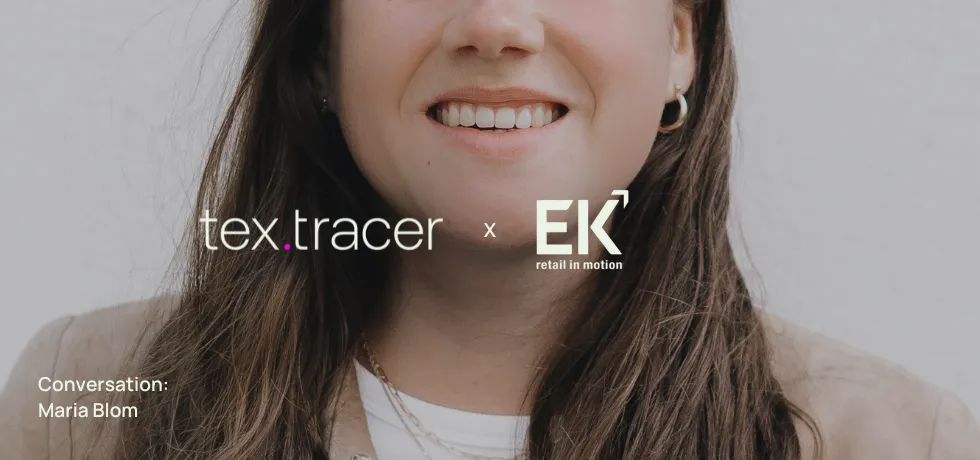Traceability as enabler of substantiated decisions
Maria and I both started at the same time last year within our new roles; Maria as CSR Specialist at Euretco/EK Service Group and I as business development coordinator at tex.tracer. We work closely together on tracing the supply chains for labels at Euretco/EK Service Group. In the past months, we have traced over 300.000 items. I invited Maria over to the tex.tracer office to finally meet each other in real life and talk about our collaboration/co-operation.
Can you tell us a bit more about your current role and your background in the fashion industry and sustainability?
I have always been interested in the fashion industry and sustainability, and put this passion into practices in my previous working experience and studies. Since November 2021, I am a CSR specialist at Euretco/EK Service Group. At Euretco/EK Service Group we want to make our own business including our private labels more sustainable and support Dutch Fashion (retail) entrepreneurs in their journey of becoming more sustainable. For retailers this includes, but is not limited to, making their buildings more sustainable, creating sustainable collections, and improving the vitality of their employees.
Can you tell us more about Euretco/EK Service Group?
Euretco/EK Service Group is the ‘power’ behind independent entrepreneurs in the Netherlands and supports about 1.500 entrepreneurs and franchisees in the industries of fashion, sports, DIY, and books. In Fashion, there are about 500 independent retailers affiliated to Euretco/EK Service Group. For each industry, it may differ how Euretco supports the entrepreneurs and what the focus of the CSR team is. We aim to relieve the independent entrepreneurs in order for them to really focus on the activities on the shop floor and customer contact.
How does Euretco/EK Service Group try to create a better fashion industry, both on social as on environmental levels?
At Euretco/EK Service Group, we have first started our sustainability journey in 2016 with making the private label more sustainable on a social and environmental level. We have seen that both levels go hand in hand. Later on, we included retailers in this journey. The independent retailers are clustered in entrepreneurs groups, in which they closely work together. We visit these groups and talk with them about the topic of sustainability and the Euretco Fashion Academy we created. Of course, some react very enthusiastically while others are less interested in becoming more sustainable. We really want to help them become more sustainable in their collections, both on a social as on an environmental level, but also to focus more on the (mental) health of employees in the workplace in the Netherlands itself. Partly due to Covid-19, we have seen that a staff shortage may result in employees having an extra workload.
The request for more product supply chain and footprint information is rising. How important is a transparent supply chain to you?
I believe that the first step is to be able to trace your supply chain, because you need to know what the risks are. Without knowing where you produce you are not able to map out the risks. That is why traceability is very important to us at Euretco/EK Service Group. Transparency is more about the communication to the outside where the production takes place and what the impact is.
For us, knowing what the risks are is most important, and also being able to make substantiated decisions. Actually, it is the foundation: if you don’t know where you produce, you are not able to make improvements. Even though it is the foundation, it is really difficult to trace the entire supply chain.
What is the added value of tex.tracer to you?
tex.tracer gives us an extensive overview of all the orderlines and production locations. Though still in development, the platform is organised logically, and it is very user-friendly. Our buyers can also easily work with tex.tracer.
We are looking forward to the compliance module, in order to have an overview of all compliance documents.
How does the data provided by tex.tracer help you in your current role?
At this moment we are not using the data for reporting or communication, as there is not much to report on yet in tex.tracer. We do not yet have all our supply chains fully traced in tex.tracer and are working on that very hard. More insights in the supply chain would be needed to really use the data. Of course, we are very much looking forward to the future developments of the platform so we can use it more intensively.
The compliance module went live after this interview.
How have you experienced the past months working with tex.tracer?
For me, the experience with tex.tracer has been very positive. Beyond the platform itself, communication and contact run very smoothly and fast. It really feels that you listen to what our needs are and react to them properly. Also helping us to motivate suppliers and other employees to join and work with the platform is very valuable.
Next to that, the new features such as bulk customisation are very useful and for us essential.
Above all the great things the platform gives us as a company, personal contact is appreciated the most.
Thanks Maria, for this interesting talk and your trust in tex.tracer. Together, we create a transparent fashion industry!
Talk soon, Alexandra




